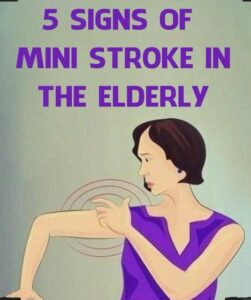Stroke Warning Signs That May Appear a Month Before an Attack

Many people assume strokes strike without notice, but the truth is that the body often sends subtle warning signals—sometimes weeks in advance. Recognizing these signs early can be critical in preventing serious, lasting damage or even death.
1. Numbness or Weakness on One Side
A common early red flag is a feeling of weakness or numbness, particularly on one side of the body. It might begin as a faint tingling in the arm, leg, face, or hand. People often mistake it for muscle strain or tiredness, but it could actually be an early sign of reduced blood flow to the brain.
2. Vision Problems
Sudden changes in your vision—such as blurriness, double vision, or partial blindness in one or both eyes—can also point to a potential stroke. These disturbances may come and go, making them easy to dismiss, but they shouldn’t be ignored.
3. Unusual Headaches
Severe headaches that feel different from your normal ones may also indicate something is wrong. If they appear out of nowhere and are accompanied by symptoms like neck pain, light sensitivity, or nausea, they could be a warning of brain issues ahead.
4. Dizziness and Balance Issues
Feeling lightheaded, off-balance, or experiencing sudden trouble walking could be another early signal. Some individuals report sensations like the room spinning or being on the verge of fainting—symptoms that shouldn’t be taken lightly.
5. “Mini-Strokes” or TIAs
Transient ischemic attacks (TIAs), often called mini-strokes, mimic the symptoms of a full stroke but typically resolve within an hour. While they may seem harmless, TIAs are urgent red flags that a more serious stroke could be coming soon.
6. Trouble Speaking or Understanding Others
Sudden problems with speech—slurred words, difficulty forming coherent sentences, or struggling to comprehend what others are saying—can precede a stroke. Even if these issues pass quickly, they should be taken seriously.
7. Unexplained Shortness of Breath
If you’re experiencing sudden breathlessness without an obvious cause, especially alongside other symptoms, it could be a warning sign of cardiovascular stress that raises stroke risk.
Why It Matters
Being alert to these subtle signals could mean the difference between full recovery and permanent damage. Even if the symptoms fade, they may indicate that a stroke is on the horizon. Don’t wait for things to get worse—seek emergency medical help right away.
Act Fast—Your Brain Depends On It
When it comes to strokes, every second counts. Getting treatment early can dramatically improve outcomes and protect brain function. Be aware, stay alert, and don’t hesitate to act.